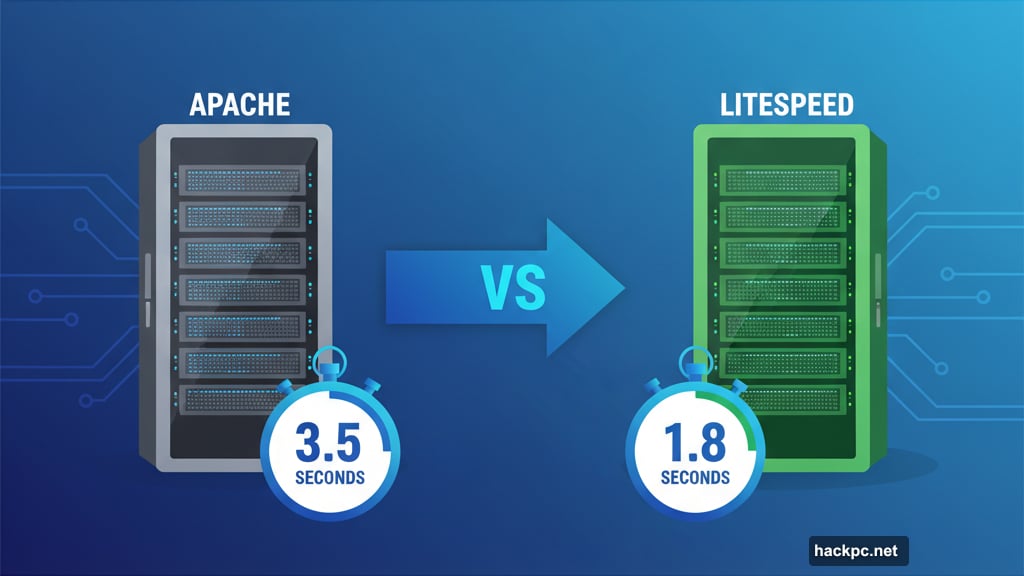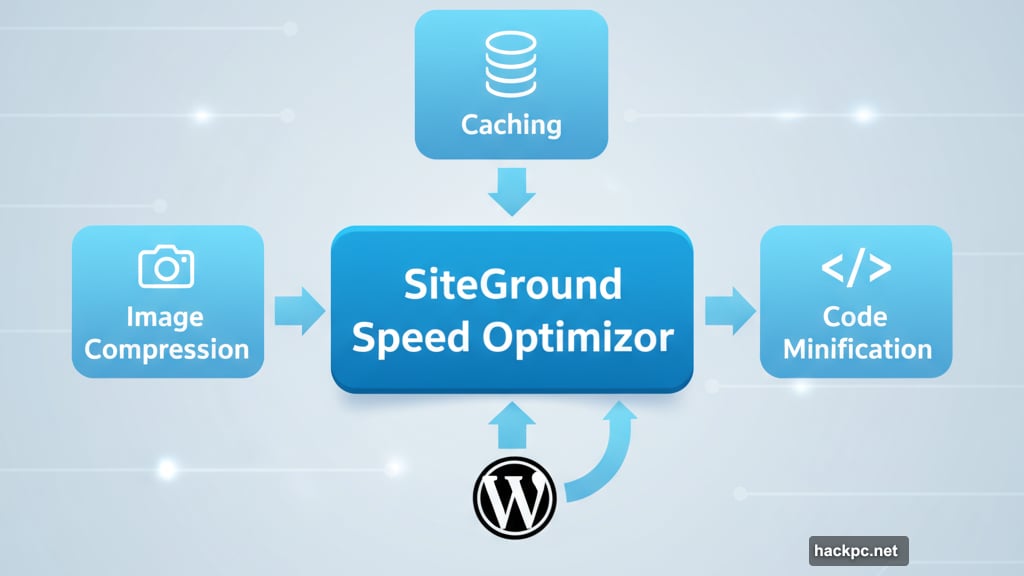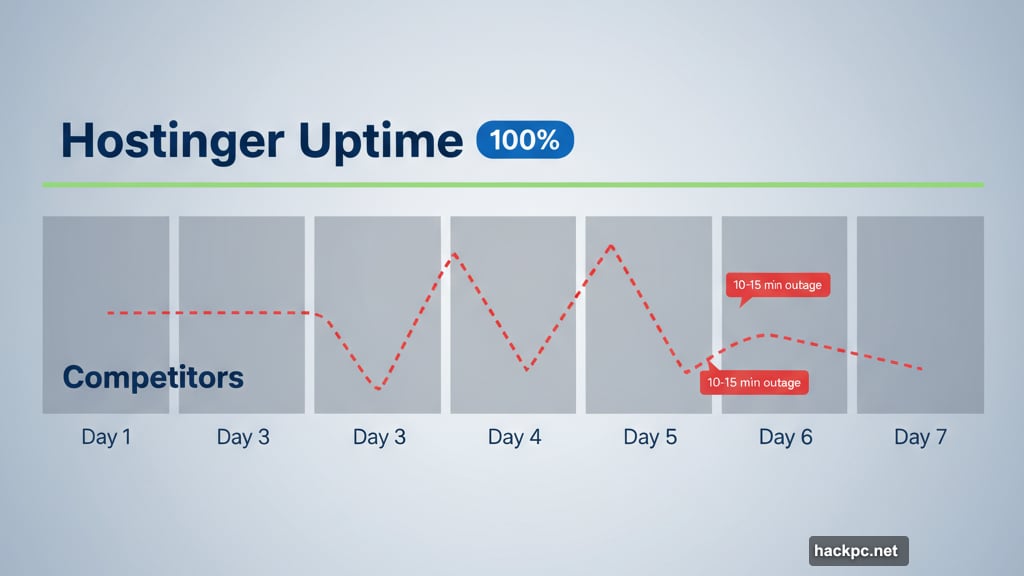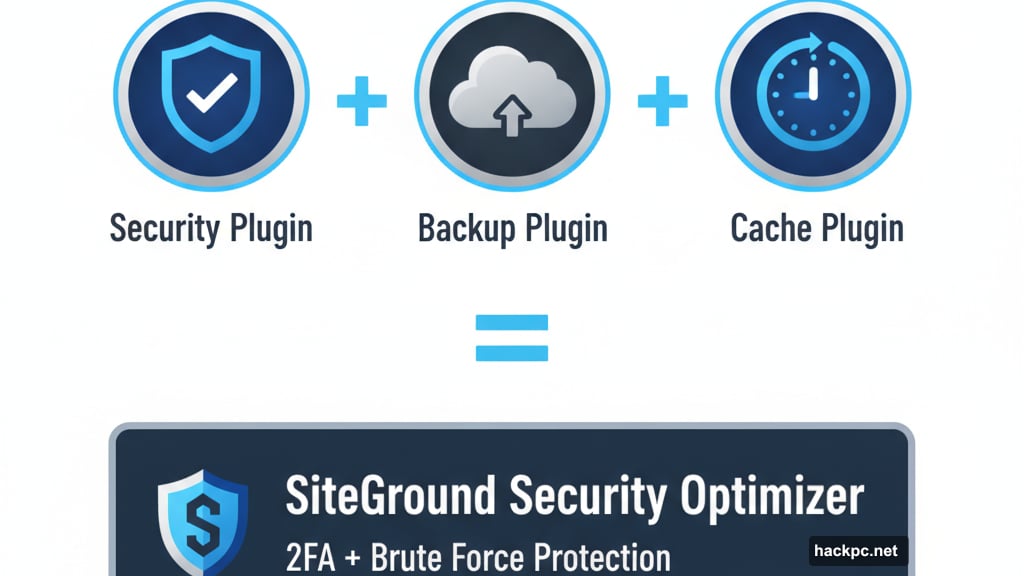
I spent a year testing web hosting companies. Most promises about “blazing speed” turned out to be marketing fluff.
But five hosts delivered consistent performance that actually matched their claims. Plus, their servers stayed online when competitors buckled under traffic spikes. Let’s break down what separates real performance from empty promises.
SiteGround Built Speed Tools Other Hosts Ignore
Most web hosts say they optimize WordPress. SiteGround actually does it.
Their Speed Optimizer plugin runs automatically on every WordPress site. It compresses images, enables caching, and minifies code without you touching a single setting. Meanwhile, competitors force you to hunt down third-party plugins that may or may not work together.
I tested this during setup. My test site loaded in under two seconds on desktop without any manual optimization. That’s faster than sites I’ve spent hours tweaking on other hosts.
Moreover, SiteGround updates WordPress core, themes, and plugins automatically. Other managed WordPress hosts update the core software but leave plugins alone. So you’re constantly logging in to click update buttons or risking security vulnerabilities.
The Security Optimizer plugin handles two-factor authentication and brute force protection through one interface. Competitors either skip these features or make you install five different plugins to get the same protection.
But here’s the catch. SiteGround costs more than budget hosts. The cheapest plan starts at $3 monthly but jumps to $18 on renewal. Still, you’re paying for tools that would cost $200+ per year if purchased separately.
Hostinger Delivered 100% Uptime While Others Crashed
Every host promises 99.9% uptime. Hostinger exceeded it.
I monitored my test site for seven days straight. Zero downtime. Not even a blip. Meanwhile, other “reliable” hosts went offline for 10-15 minutes during the same period.
Desktop pages loaded in 1.8 seconds average. Mobile took longer at 2.9 seconds, but still fell within the three-second threshold experts recommend. Plus, these speeds came from default settings with zero optimization work.
Hostinger uses LiteSpeed servers on all shared hosting plans. This technology processes requests faster than traditional Apache servers used by most budget hosts. Yet Hostinger charges the same $3 monthly starting price as competitors using slower hardware.
The guided WordPress setup impressed me most. It asks what type of site you’re building, suggests appropriate themes, and installs essential plugins automatically. You’re creating content within 10 minutes instead of spending an hour researching which plugins you need.
Security goes beyond basics too. You get weekly backups on entry plans where other hosts charge extra for this feature. Malware scanning runs automatically. WordPress vulnerability checks flag risky plugins before they cause problems.
However, customer support disappointed me. Live chat connects you to an AI bot first. Requesting a human agent took 35 minutes on two separate occasions. If you need help immediately, this delay creates real problems.
Liquid Web Costs More But Delivers Measurable Results

Liquid Web charges $8 monthly while competitors advertise $3 plans. But renewal pricing stays at $8 instead of tripling like other hosts.
My test site maintained 100% uptime during monitoring week. Average load time hit 2.37 seconds without enabling any of Liquid Web’s performance tools. That’s impressive considering I hadn’t touched caching settings or installed compression plugins.
The WordPress management center sets Liquid Web apart. You can install premium plugins worth $500+ per year through one dashboard. Speed optimization tools, security plugins, and SEO software all load with single clicks instead of manual purchases and installations.
Solid Security Pro comes included on mid-tier plans. This plugin normally costs $99 annually. It handles IP restrictions, two-factor authentication, and brute force protection through an interface that actually makes sense. SiteGround offers similar features, but Liquid Web’s implementation feels more polished.
Daily backups run automatically on all plans. Malware scanning happens continuously. DDoS protection blocks malicious traffic before it reaches your site. Yet many hosts charge extra for these features or skip them entirely on basic plans.
But the cheapest plan lacks firewall protection. You need the $8 mid-tier plan to get essential security features. So the advertised $4 starting price misleads anyone building a real website.
Ionos Answered Support Questions in Two Minutes
Ionos support picked up the phone immediately. Live chat connected me to humans in under three minutes. Email responses arrived within 15 minutes.
Other hosts? I waited 40+ minutes for live chat. Phone support sent me through automated menus that looped back to the start. Email tickets took four hours minimum.
Ionos offers 14 international phone numbers. You also get a dedicated consultant available during business hours. When that person’s busy, another agent steps in immediately instead of making you wait.
The technical knowledge impressed me too. I asked about configuring custom DNS records. The support agent walked me through the exact steps instead of sending generic documentation links.
However, Ionos servers performed adequately but not spectacularly. Average load time scraped just under three seconds. That’s acceptable but nowhere near Hostinger’s sub-two-second speeds.
Site speed matters for bounce rates. Google reports that bounce rate increases 32% when load time goes from one to three seconds. So Ionos’s middling performance could cost you visitors.
But daily backups come standard on all plans. Most hosts only provide weekly backups at entry levels or charge extra for daily backups. If something breaks your site, you can restore yesterday’s version instead of losing a week of work.
AccuWeb Beats Hostinger’s Renewal Pricing
AccuWeb charges $2 monthly for WordPress hosting. That price rises to just $2.50 on renewal.
Compare that to Hostinger’s $3 introductory rate that jumps to $11 on renewal. Or SiteGround’s $3 that becomes $18. Over three years, AccuWeb saves you $200+ compared to competitors.
You still get LiteSpeed servers for improved performance. Built-in caching accelerates page loads. CDN distributes your content globally for faster international speeds.
Security matches expensive hosts too. Daily backups run automatically. Malware scanning detects threats. DDoS protection blocks malicious traffic. SSL certificates encrypt data transfers.

But there’s a limitation. Phone support isn’t available Sundays. Live chat and email still work, but some users prefer phone service for urgent issues.
The basic plan includes 10GB storage and 100GB bandwidth. That’s enough for 100 pages and roughly 100,000 monthly visitors. Small hobby sites and portfolios fit comfortably within these limits.
However, you need to commit to three years upfront for the best pricing. Shorter contracts cost more per month. So AccuWeb works best if you’re certain about long-term site management.
Most “Unlimited” Plans Hide Real Limits
Every host advertises unlimited bandwidth or storage. Then you read the fine print.
“Unlimited” usually means “reasonable use.” If your traffic spikes suddenly, the host may suspend your account for “abnormal usage.” One blogger I know got shut down when a post went viral on Reddit.
Hostinger clearly states 25,000 monthly visitors on its basic plan despite claiming unlimited bandwidth. At least you know the real limits upfront.
GreenGeeks and Ionos offer truly unmetered bandwidth. Your site can handle traffic surges without surprise suspensions. But you still face storage limits that vary by plan.
The honest approach? Calculate your actual needs. A blog with 50 posts and 100 images needs maybe 5GB storage. An online store with 200 products and high-res photos might need 50GB.
Then pick a plan with headroom for growth. Don’t trust “unlimited” marketing speak.
Website Builders Cost Extra Almost Everywhere
SiteGround includes website builder hosting but charges the same as WordPress hosting. You’re paying $18 monthly on renewal either way.
Hostinger bundles a website builder with most plans. The builder includes 150+ templates and AI site generation. You describe your business, pick colors, and let AI build the layout. It’s not perfect but creates a solid starting point in 10 minutes.
Ionos charges $12-$18 monthly for website builder plans. However, these plans lack features like e-commerce tools unless you upgrade to premium tiers.
Website builders work great if you hate code. Drag-and-drop interfaces let you design pages visually. But you sacrifice flexibility compared to WordPress.
WordPress offers 54,000+ plugins for any feature imaginable. Website builders limit you to their built-in tools. Want custom functionality? You’re probably stuck.
I recommend WordPress for business sites that might need advanced features later. Use website builders for simple portfolios or landing pages that won’t grow much.
Cloud Hosting Promises Don’t Match Reality

Cloud hosting spreads your data across multiple servers. If one server fails, others keep your site running.
Sounds great. But prices reveal the truth.
Hostinger charges $30 monthly for cloud hosting. SiteGround wants $100 monthly. For small sites, these costs vastly exceed shared hosting benefits.
Plus, most small websites don’t need cloud redundancy. Your hobby blog getting 500 monthly visitors won’t benefit from multi-server architecture.
Cloud hosting makes sense for high-traffic e-commerce stores or business sites handling thousands of daily visitors. But entry-level sites waste money chasing enterprise features they’ll never use.
Start with shared hosting. Upgrade to cloud when traffic justifies the cost. Don’t buy capabilities you don’t need yet.
Security Features Matter More Than Speed
Fast servers mean nothing if hackers compromise your site.
Look for these essentials on every plan:
SSL certificates encrypt data between your site and visitors. Google penalizes sites without SSL in search rankings. Browsers display scary warnings. It’s not optional anymore.
Firewall software blocks malware before it reaches your site. Mod Security works fine, but custom firewalls from hosts like SiteGround and Liquid Web catch more sophisticated threats.
DDoS protection prevents malicious traffic from overwhelming your server. Without this, attackers can take your site offline for hours or days.
Automated backups let you restore your site if anything goes wrong. Daily backups cost extra on most hosts. But weekly backups on free plans beat no backups at all.
Malware scanning detects infected files automatically. Some hosts remove malware free. Others charge $100+ for cleanup services after attacks.
Budget hosts skip crucial security features to keep prices low. You’ll pay more later fixing problems than you saved initially.
Renewal Pricing Reveals True Costs
That $3 monthly plan you’re excited about? It becomes $18 next year.
Every host discounts introductory pricing to win customers. Then renewal rates jump 200-500%. You’re locked into higher prices unless you switch hosts and migrate your site.

AccuWeb provides the most honest pricing. The $2 plan rises to just $2.50 on renewal. That’s transparency other hosts should copy.
Liquid Web doesn’t raise prices at all. The $8 monthly cost stays $8 forever. You know exactly what you’ll pay in three years.
Calculate total three-year costs before choosing a host. A cheap first year followed by expensive renewals often costs more than consistently priced competitors.
Also watch contract lengths. Hostinger requires four-year commitments for best pricing. Ionos needs three years. Can you confidently commit to running your site that long?
Month-to-month plans cost 2-3x more than annual contracts. But you gain flexibility to switch hosts without losing prepaid months.
Email Hosting Usually Costs Extra
Building a website? You probably want custom email addresses too.
Most hosts advertise free email hosting. Then you discover “free” means one or two addresses. Additional addresses cost $1-5 monthly each.
Hostinger includes email on most plans but limits you to basic features. Want calendars, contact sync, or large attachments? Upgrade to premium email for $1+ monthly per address.
AccuWeb and Liquid Web bundle more generous email allowances. However, professional email services like Google Workspace or Microsoft 365 offer better tools for $6-12 monthly per user.
I recommend separating web hosting and email services. When you switch hosts, you won’t lose email access. Plus, professional email providers deliver better spam filtering and larger storage quotas.
These Hosts Failed My Tests Badly
Several popular hosts disappointed me during testing.
Hosting.com (formerly A2 Hosting) crashed for 72 minutes during my week of monitoring. Customer support took an hour to respond to urgent tickets. Site speeds averaged over four seconds.
InMotion Hosting went offline for one hour and 12 minutes. That’s terrible uptime performance. Phone support never answered. Live chat queues exceeded 30 minutes.
Both hosts make big promises about reliability. Neither delivered during real-world testing.
GoDaddy performed adequately but charges extra for features other hosts include. SSL certificates cost money after year one on basic plans. Security features exist only on premium tiers.
Bluehost requires you to pay $90 annually for SSL after the first free year. Most hosts include SSL permanently. That recurring fee adds up to real money over time.
I can’t recommend hosts that nickel-and-dime customers or deliver poor performance. Too many better options exist.



Comments (0)